人教版高二英语选修7 Unit 1 Living well Grammar课件(59张)
文档属性
| 名称 | 人教版高二英语选修7 Unit 1 Living well Grammar课件(59张) | 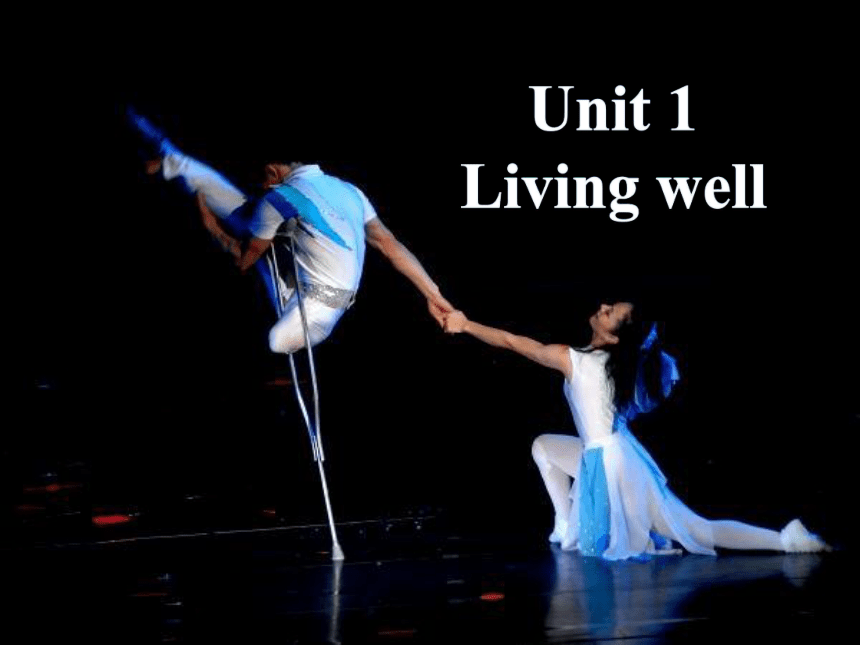 | |
| 格式 | zip | ||
| 文件大小 | 2.1MB | ||
| 资源类型 | 教案 | ||
| 版本资源 | 人教版(新课程标准) | ||
| 科目 | 英语 | ||
| 更新时间 | 2020-02-16 21:30:29 | ||
图片预览

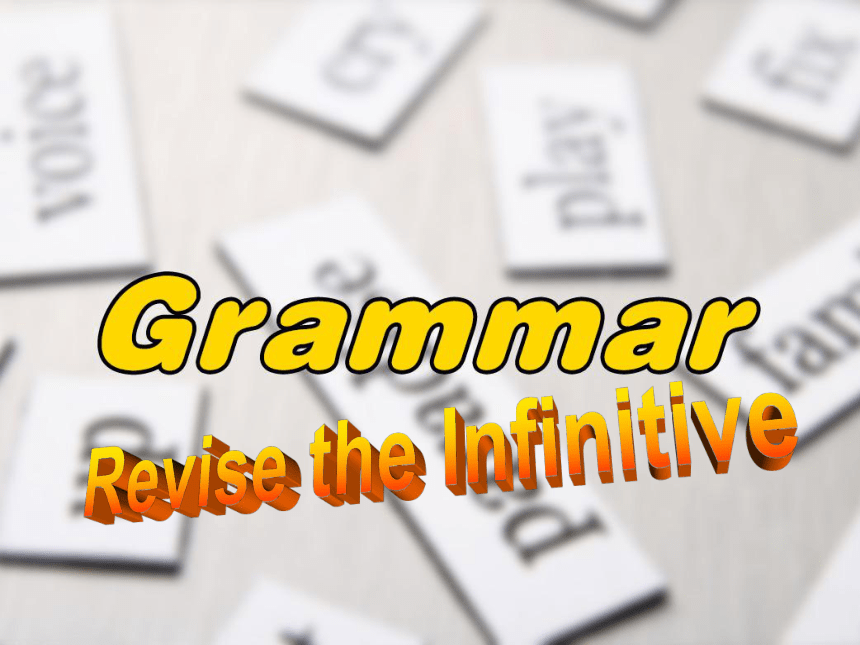
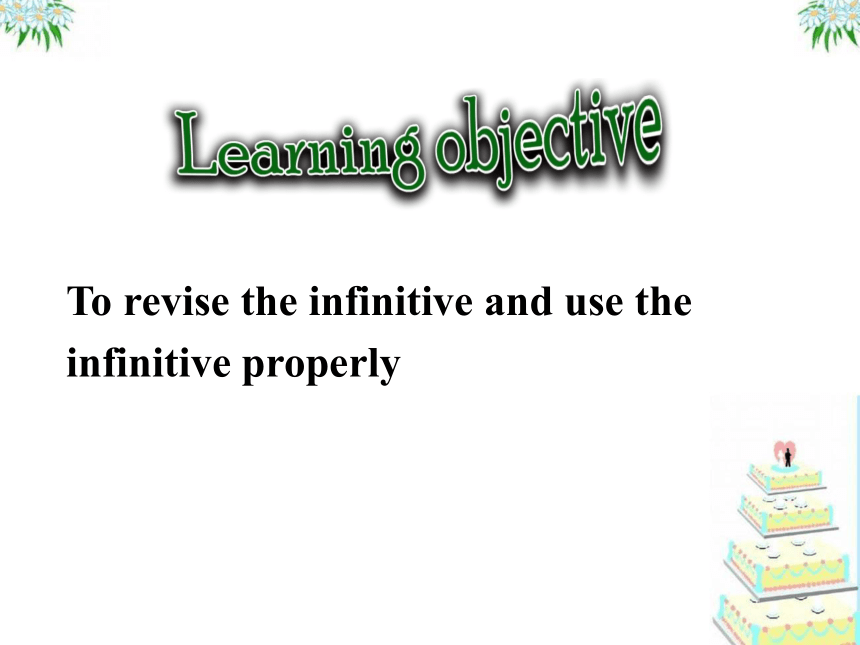
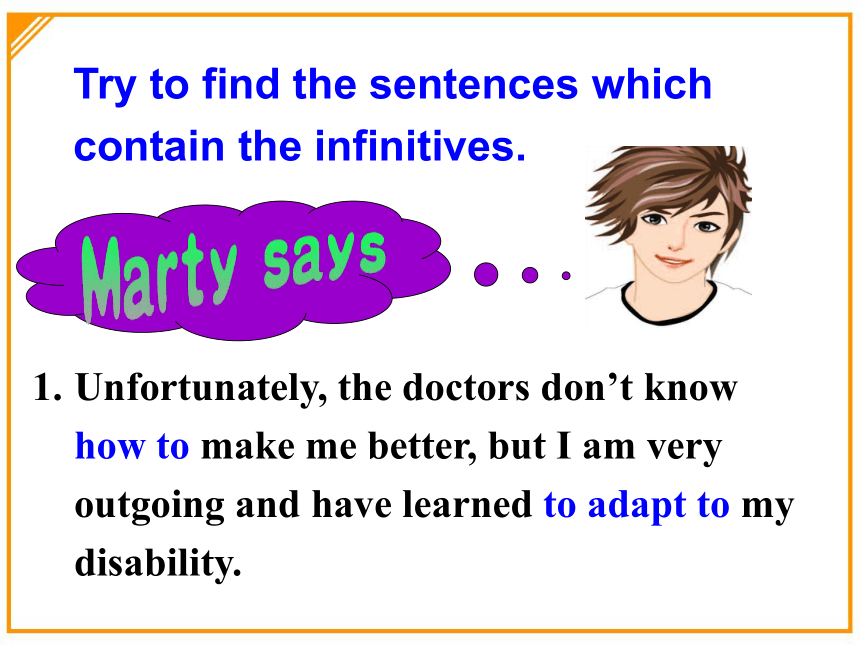
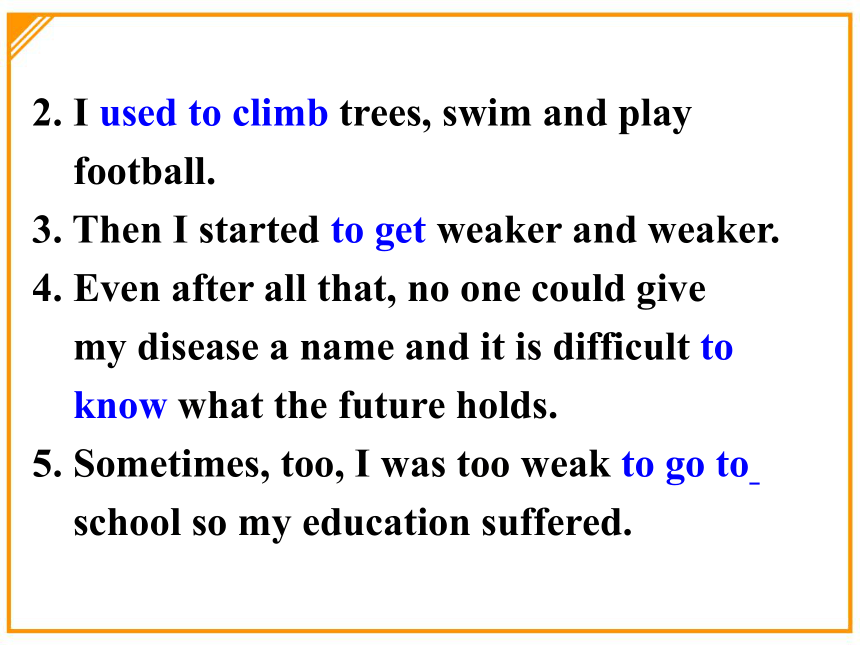

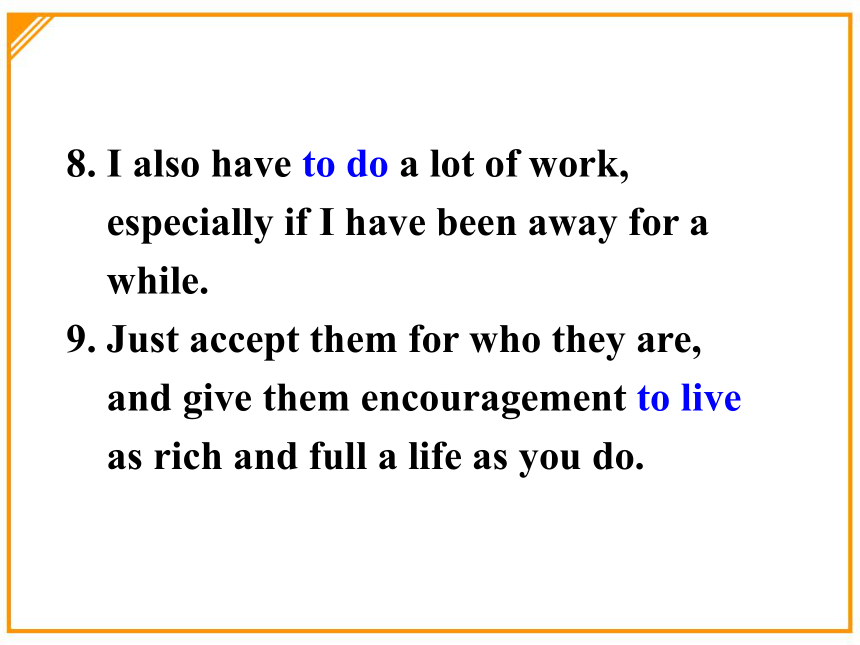
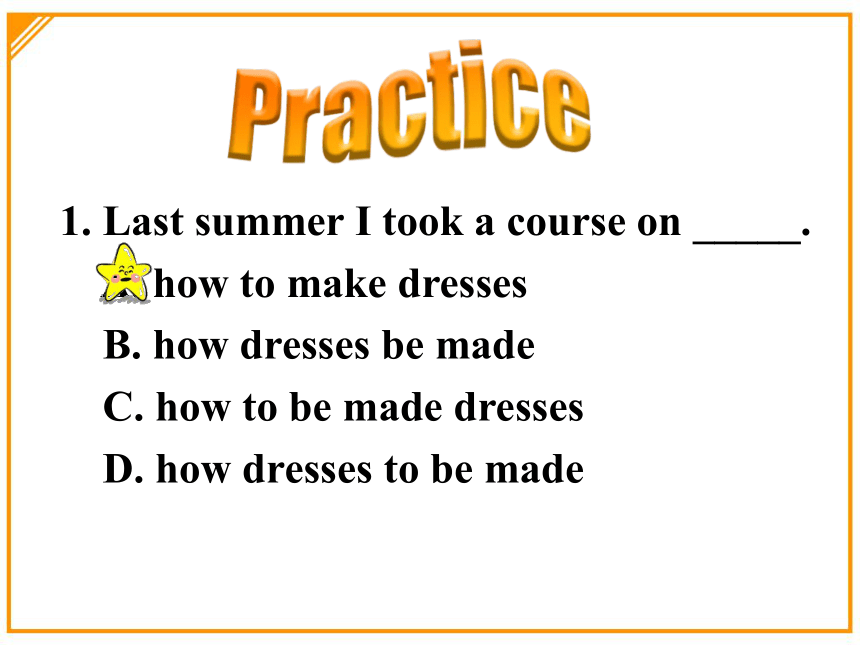
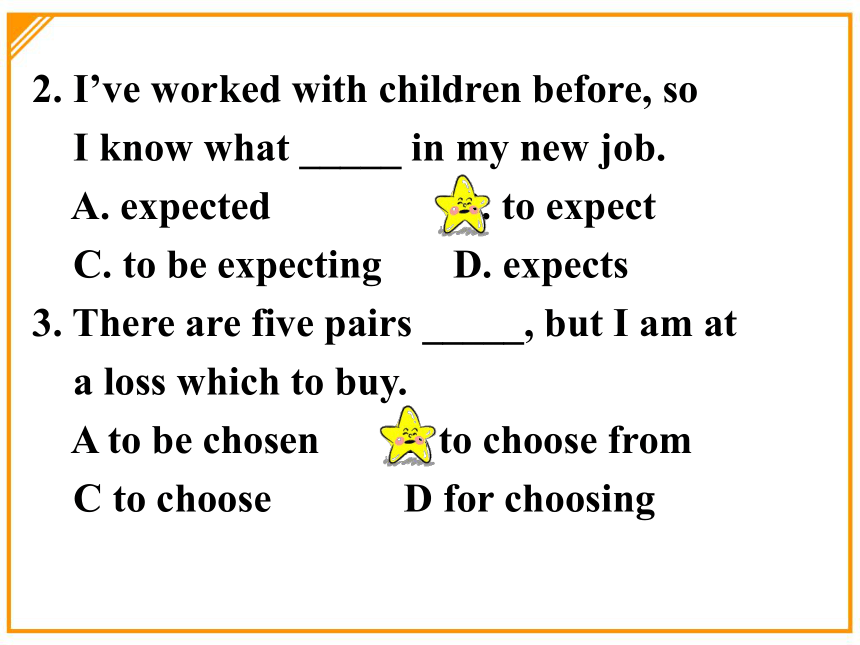
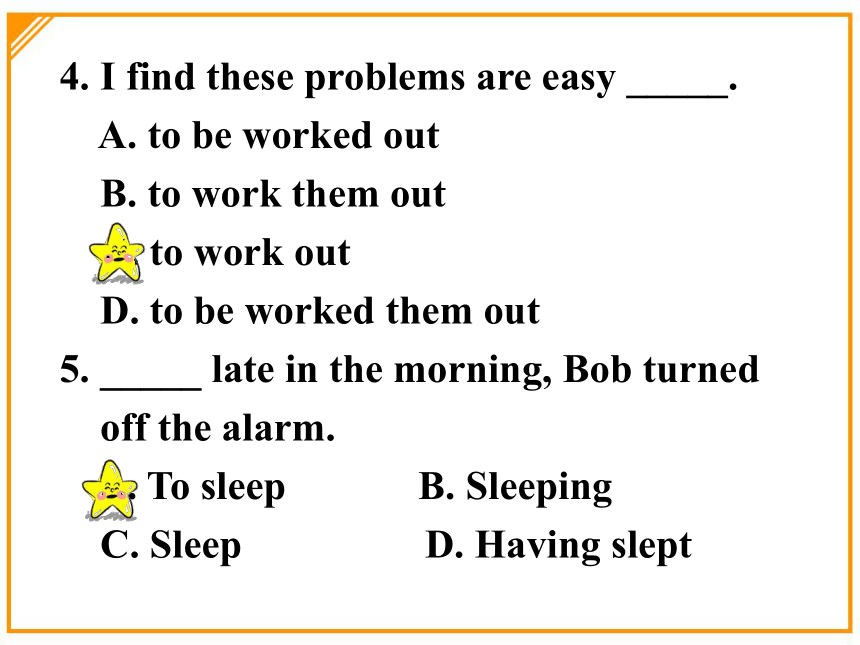
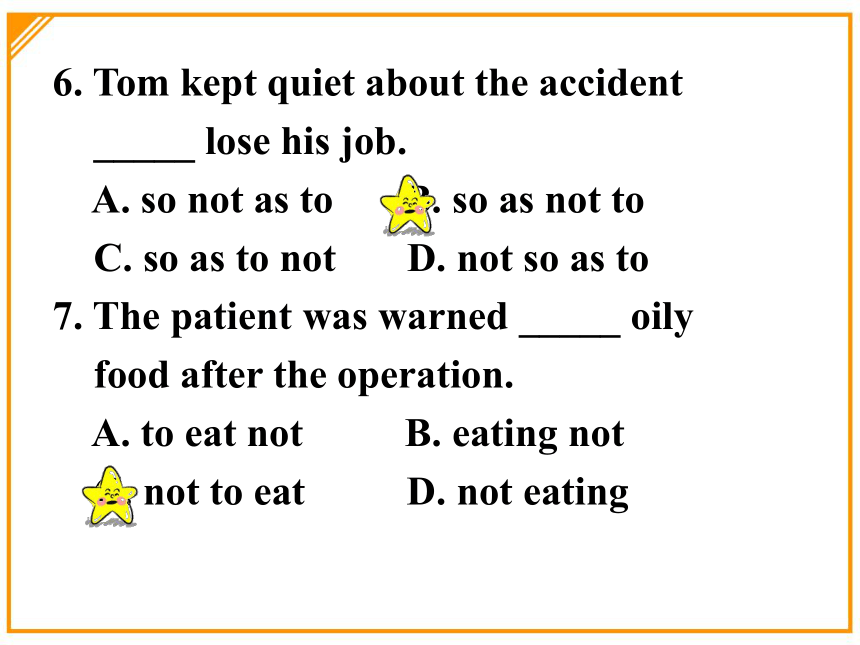

文档简介
课件59张PPT。Unit 1
Living wellRevise the InfinitiveTo revise the infinitive and use the infinitive properlyTry to find the sentences which contain the infinitives.Unfortunately, the doctors don’t know how to make me better, but I am very outgoing and have learned to adapt to my disability.2. I used to climb trees, swim and play
football.
3. Then I started to get weaker and weaker.
4. Even after all that, no one could give
my disease a name and it is difficult to
know what the future holds.
5. Sometimes, too, I was too weak to go to
school so my education suffered.6. My ambition is to work for a firm
that develops computer software
when I grow up.
7. Last year I invented…and a big
company has decided to buy it from
me.8. I also have to do a lot of work,
especially if I have been away for a
while.
9. Just accept them for who they are,
and give them encouragement to live
as rich and full a life as you do.1. Last summer I took a course on _____.
A. how to make dresses
B. how dresses be made
C. how to be made dresses
D. how dresses to be made2. I’ve worked with children before, so
I know what _____ in my new job.
A. expected B. to expect
C. to be expecting D. expects
3. There are five pairs _____, but I am at
a loss which to buy.
A to be chosen B to choose from
C to choose D for choosing4. I find these problems are easy _____.
A. to be worked out
B. to work them out
C. to work out
D. to be worked them out
5. _____ late in the morning, Bob turned
off the alarm.
A. To sleep B. Sleeping
C. Sleep D. Having slept6. Tom kept quiet about the accident
_____ lose his job.
A. so not as to B. so as not to
C. so as to not D. not so as to
7. The patient was warned _____ oily
food after the operation.
A. to eat not B. eating not
C. not to eat D. not eating不定式由“to + do (动词原形)”构成, 其否定形式是“not to do”, 不定式可以带宾语或状语构成不定式短语, 没有人称和数的变化, 但有时态和语态的变化。The definition of infinitive 1. 主语 (subject)
2. 表语 (predicative)
3. 宾语 (object)
4. 宾补 (object complement)
5. 定语 (attribute)
6. 状语 (adverbial)
7. 独立结构 (absolute construction) e.g. To learn English well is difficult.
动词不定式作主语时,为了保持句子平衡,常用it代替它作形式主语,而将真正的主语—动词不定式后置,上面的例句常写为:It’s difficult to learn English well.1. 不定式作主语(subject)e.g. My job is to protect the world.2. 不定式作表语(predicative)不定式常用在系动词be, seem, appear,
get, remain等后作表语。 Seeing is to believe.
To see is believing.
To see is to believe.All you have to do is (to) finish the job
quickly.如果主语部分有个表示不定式内容的do, 用作表语的不定式可省略to。3. 不定式作宾语(object)e.g. Jeremy Lin likes to play basketball.
The girl decided to do it herself.
We hope to get there before dark.agree, afford, appear, ask, attempt,
care, choose, claim, dare, decide, demand, deserve, determine, expect, fail, get,
hate, hesitate, hope, hurry, intend, learn, manage, offer, plan, prepare, pretend, promise, refuse, seem, tend, threaten,
want, wish常见加不定式作宾语的动词有:e.g. I’m glad / pleased to see you.
We were surprised to hear the news.Look at the sentences and find the rules.不定式可以用在某些形容词后作宾语,如:sorry, surprised, happy, glad, eager, angry, foolish, right, wrong, slow, quick, rude, cruel, disappointed…e.g. My mum asks me to play the piano
two hours every day.4. 不定式作宾补 (object complement)常跟动词不定式作宾语补足语,这类动词有
allow, advise, ask, call, cause, encourage,
expect, force, get, help, invite, need, order,
prefer, remind, teach, tell, train, want, warn
等。1) 不定式在感官动词(feel, hear, listen to,
watch, look at, notice, observe)后;
2) 使役动词 (let, have, make)后, 但是在被
动语态中要还原to。不定式作宾补时不带to的情况3) 不定式用在介词but, except, besides后时,
如果这些介词前有行为动词do的各种形式,
那么介词后的不定式不带to, 相反则带to。e.g. She could do nothing but cry.
I have no choice but to go.Kate is looking for a suitable coat
to wear.
Tom has a nice pen to write with.5. 不定式作定语(attribute)不定式作定语与所修饰的词之间有三种关系:e.g. I have a lot of work to do.
我有很多工作要做。
e.g. He is always the first to come.
他总是第一个来。
e.g. We all have a chance to go to college.
我们都有上大学的机会。(1) 动宾关系(2) 主谓关系(3) 同位关系不定式作定语时常放在被修饰的名词
或代词之后。
(a) She was very busy and had no time
to visit her friends.
(b) Ladies and gentlemen, I have
something important to tell you.当名词被the first, the last, the only等词以及形容词最高级修饰时,后常用不定式作定语。
e.g. She is always the first to come and
the last to leave.something, anything, nothing, everything等复合不定代词常用不定式作后置定语。如果不定式是不及物动词, 则后面需加
适当的介词。
e.g. Please pass me some paper to write
___. on1) Have you anything to send?
你有什么东西要寄吗?
2) Have you anything to be sent?
你有什么要(我或别人)寄的东西吗?(不定式to send的动作执行者是you)(不定式to be sent的动作执行者是
已被省略的me或someone else)e.g. I got up early to catch the train.在一些短语中也有体现: in order to,
so as to, enough to, only to。6. 不定式作状语(adverbial)e.g. He spoke loudly (so as / in order)
to be heard.1) 表示目的: to
in order to
so as to2) 表示原因:
不定式可以用在作表语的形容词后作
状语, sorry, surprised, happy, glad, eager,
angry, foolish, right, wrong, slow, quick,
rude, cruel, disappointed等。e.g. I’m glad / pleased to see you.
We were surprised to hear the news.so + adj. / adv. + as to do …
such + n. + as to do …
adj. / adv. + enough + to do
too + adv. / adj. + to doe.g. He was so foolish as to believe it.
= He was such a fool as to believe it.
= He was foolish enough to believe it.3) 结果状语:To tell the truth, I am not happy at the
moment. to be frank
to be honest
to tell the truth7. 独立结构(absolute construction)1. It is good to help others.
2. It is my ambition to make sure that the disabled people in our neighborhood have access to all public buildings.
3. My ambition is to work in the computer industry when I grow up. Identify its functionsubjectsubjectpredicative4. I don’t have time to sit around feeling sorry for myself.
5. I am the only student in my class to have a pet snake.
6. A big company has decided to buy it from me.
7. My fellow students have begun to accept me for who I am. attributeattributeobjectobject8. I have had to work hard to live a normal life.
9. Some days I am too tired to get out of bed.
10. We must call on local government
to give financial assistance to
disabled people. adverbialadverbialobject complementto doto have doneto be doingto have been
doingto be doneto have been
done I am glad to see you.
He has decided to give her some money.
表示的动作通常与谓语所表示的动作
或状态同时或者几乎同时发生,或是
在它之后发生。不定式的一般时 to doI am very glad to be working with you.
He pretended to be working hard
when his boss passed him.
表示的动作通常与谓语动词表示的动
作同时发生。不定式的进行时 to be doingHe happened to have seen the film before.
The novel is believed to have been
translated into Chinese.
不定式所表示的动作发生在谓语动作
或状态之前。不定式的完成时 to have doneSomething worth
your attentionstop to do sth. 停下来去做某事
doing sth. 停止做某事
forget to do sth. 忘记去做某事
doing sth. 忘记已做了某事
remember to do sth. 记得去做某事
doing sth. 记得曾经做某事几对易混淆的词组:Read the dialogue below with the correct pronunciation and intonation. Then underline the perfect infinitives in it. Notice the expressions that are followed by the infinitives.JO: Oh! Am I late? I’m sorry to have kept
you waiting.
SUE: No, you’re fine.
JO: Thank you. The trouble is I can’t find my
shopping list. SUE: Oh dear! Where on earth could you
have put it?
JO: Well, it isn’t in my bag. I might have left it on the kitchen table. I seem to have forgotten so many things now that Christmas is here.
SUE: I quite understand. So many presents to buy and so many cards to send!JO: True. I was supposed to have finished all my shopping by now but…
SUE: Never mind. Nobody is said to have finished till there’s no more left to buy!
JO: Quite right. Oh look, here’s my list — in my pocket.
SUE: Let’s get to work then!Living well means enjoying the same rights and the same opportunities for a good life. Complete the passage below about a man who helped give opportunities to black people in 19th-century England. Remember to use infinitives correctly. William Wilberforce was a great man. He is known ___________ (spend) eighteen years fighting for slaves. _______ (free) slaves was his ambition. He was a very kind man, who did not like _____ (see) people going hungry or in pain. He wanted to do some good in the world. The cause which attracted him most was the abolition of the slave trade. to have spentTo freeto seeAfricans were taken from their homes and sold in markets. A master was able by law ________ (treat) his servants as he wished – even working them to death if he wanted to. Wilberforce was not the only person that was interested in this cause, but he was in politics and so able ____________ (help pass) the law which made it illegal. to treatto help passFinally the slave trade was abolished in 1807. Wilberforce then resigned from government in 1825 and died in 1833, just after the law was passed which was eventually __________ (abolish) slavery in England.to abolishHave you ever wished to go back in time and meet famous people from the past? They might be leaders, pioneers or writers of great literature. In pairs discuss who you would like to have met.S1: Who would you like to have met / seen / spoken to / talked with /…?
S2: I’d like to have met / seen / spoken to / talked with /…
S1: Why would you choose him/her?
S2: I’d like to have asked him/her…?I. 用括号内所给动词的正确形式填空。
1. —You’ve come just in time ________
(help) us, Tony.
—Fine. What needs ______________ (do)?
2. Let’s hurry. Mary is likely ___________ (wait) for us.
3. The building is said _________________ (destroy) in a fire two years ago.to help to be done/doing to be waiting to have been destroyed 4. John doesn’t look sick at all. He seems _______________ (recover) completely.
5. I happened ____________ (stand) in the doorway when he rushed in.
6. The total is difficult for us ___________ (figure) out.
7. What I want is not _________________ (interrupt) while I am working.to have recovered ?to be standing to figure to be interrupted 8. Nobody is allowed ________ (go) in. The committee seem _______________ (discuss) an important problem.
9. The professor spoke slowly enough for everyone _____________ (understand).
10. That morning, it was too foggy for us
________ (see) the traffic light.to go to be discussing to understand to see II. 完成下列对话。
1. A: Hello, Kevin, how was your summer holiday? You seem to have enjoyed a fantastic one.
B: Yes, of course. I went to Mountain Tai with my family. ___________________
_____________ (它确实是个值得去的好地方). To share it with you, I took a lot of pictures. And I have something interesting to tell you.
A: Great! It is really a good place to visit 2. A: Julia, I have a meeting to attend tomorrow, so I will fly to Wuhan. ______________________________________ (有没有什么东西需要给你带的)?
B: No thanks. Oh, by the way, did you go to Stefanie Sun’s concert yesterday?Do you have anything to be taken for youA: I hurried to the ticket office yesterday,
________________________________
(却被告知票已卖完了).only to be told there was no ticket leftFinish exercise 1, 2, 3 on page 49.
Living wellRevise the InfinitiveTo revise the infinitive and use the infinitive properlyTry to find the sentences which contain the infinitives.Unfortunately, the doctors don’t know how to make me better, but I am very outgoing and have learned to adapt to my disability.2. I used to climb trees, swim and play
football.
3. Then I started to get weaker and weaker.
4. Even after all that, no one could give
my disease a name and it is difficult to
know what the future holds.
5. Sometimes, too, I was too weak to go to
school so my education suffered.6. My ambition is to work for a firm
that develops computer software
when I grow up.
7. Last year I invented…and a big
company has decided to buy it from
me.8. I also have to do a lot of work,
especially if I have been away for a
while.
9. Just accept them for who they are,
and give them encouragement to live
as rich and full a life as you do.1. Last summer I took a course on _____.
A. how to make dresses
B. how dresses be made
C. how to be made dresses
D. how dresses to be made2. I’ve worked with children before, so
I know what _____ in my new job.
A. expected B. to expect
C. to be expecting D. expects
3. There are five pairs _____, but I am at
a loss which to buy.
A to be chosen B to choose from
C to choose D for choosing4. I find these problems are easy _____.
A. to be worked out
B. to work them out
C. to work out
D. to be worked them out
5. _____ late in the morning, Bob turned
off the alarm.
A. To sleep B. Sleeping
C. Sleep D. Having slept6. Tom kept quiet about the accident
_____ lose his job.
A. so not as to B. so as not to
C. so as to not D. not so as to
7. The patient was warned _____ oily
food after the operation.
A. to eat not B. eating not
C. not to eat D. not eating不定式由“to + do (动词原形)”构成, 其否定形式是“not to do”, 不定式可以带宾语或状语构成不定式短语, 没有人称和数的变化, 但有时态和语态的变化。The definition of infinitive 1. 主语 (subject)
2. 表语 (predicative)
3. 宾语 (object)
4. 宾补 (object complement)
5. 定语 (attribute)
6. 状语 (adverbial)
7. 独立结构 (absolute construction) e.g. To learn English well is difficult.
动词不定式作主语时,为了保持句子平衡,常用it代替它作形式主语,而将真正的主语—动词不定式后置,上面的例句常写为:It’s difficult to learn English well.1. 不定式作主语(subject)e.g. My job is to protect the world.2. 不定式作表语(predicative)不定式常用在系动词be, seem, appear,
get, remain等后作表语。 Seeing is to believe.
To see is believing.
To see is to believe.All you have to do is (to) finish the job
quickly.如果主语部分有个表示不定式内容的do, 用作表语的不定式可省略to。3. 不定式作宾语(object)e.g. Jeremy Lin likes to play basketball.
The girl decided to do it herself.
We hope to get there before dark.agree, afford, appear, ask, attempt,
care, choose, claim, dare, decide, demand, deserve, determine, expect, fail, get,
hate, hesitate, hope, hurry, intend, learn, manage, offer, plan, prepare, pretend, promise, refuse, seem, tend, threaten,
want, wish常见加不定式作宾语的动词有:e.g. I’m glad / pleased to see you.
We were surprised to hear the news.Look at the sentences and find the rules.不定式可以用在某些形容词后作宾语,如:sorry, surprised, happy, glad, eager, angry, foolish, right, wrong, slow, quick, rude, cruel, disappointed…e.g. My mum asks me to play the piano
two hours every day.4. 不定式作宾补 (object complement)常跟动词不定式作宾语补足语,这类动词有
allow, advise, ask, call, cause, encourage,
expect, force, get, help, invite, need, order,
prefer, remind, teach, tell, train, want, warn
等。1) 不定式在感官动词(feel, hear, listen to,
watch, look at, notice, observe)后;
2) 使役动词 (let, have, make)后, 但是在被
动语态中要还原to。不定式作宾补时不带to的情况3) 不定式用在介词but, except, besides后时,
如果这些介词前有行为动词do的各种形式,
那么介词后的不定式不带to, 相反则带to。e.g. She could do nothing but cry.
I have no choice but to go.Kate is looking for a suitable coat
to wear.
Tom has a nice pen to write with.5. 不定式作定语(attribute)不定式作定语与所修饰的词之间有三种关系:e.g. I have a lot of work to do.
我有很多工作要做。
e.g. He is always the first to come.
他总是第一个来。
e.g. We all have a chance to go to college.
我们都有上大学的机会。(1) 动宾关系(2) 主谓关系(3) 同位关系不定式作定语时常放在被修饰的名词
或代词之后。
(a) She was very busy and had no time
to visit her friends.
(b) Ladies and gentlemen, I have
something important to tell you.当名词被the first, the last, the only等词以及形容词最高级修饰时,后常用不定式作定语。
e.g. She is always the first to come and
the last to leave.something, anything, nothing, everything等复合不定代词常用不定式作后置定语。如果不定式是不及物动词, 则后面需加
适当的介词。
e.g. Please pass me some paper to write
___. on1) Have you anything to send?
你有什么东西要寄吗?
2) Have you anything to be sent?
你有什么要(我或别人)寄的东西吗?(不定式to send的动作执行者是you)(不定式to be sent的动作执行者是
已被省略的me或someone else)e.g. I got up early to catch the train.在一些短语中也有体现: in order to,
so as to, enough to, only to。6. 不定式作状语(adverbial)e.g. He spoke loudly (so as / in order)
to be heard.1) 表示目的: to
in order to
so as to2) 表示原因:
不定式可以用在作表语的形容词后作
状语, sorry, surprised, happy, glad, eager,
angry, foolish, right, wrong, slow, quick,
rude, cruel, disappointed等。e.g. I’m glad / pleased to see you.
We were surprised to hear the news.so + adj. / adv. + as to do …
such + n. + as to do …
adj. / adv. + enough + to do
too + adv. / adj. + to doe.g. He was so foolish as to believe it.
= He was such a fool as to believe it.
= He was foolish enough to believe it.3) 结果状语:To tell the truth, I am not happy at the
moment. to be frank
to be honest
to tell the truth7. 独立结构(absolute construction)1. It is good to help others.
2. It is my ambition to make sure that the disabled people in our neighborhood have access to all public buildings.
3. My ambition is to work in the computer industry when I grow up. Identify its functionsubjectsubjectpredicative4. I don’t have time to sit around feeling sorry for myself.
5. I am the only student in my class to have a pet snake.
6. A big company has decided to buy it from me.
7. My fellow students have begun to accept me for who I am. attributeattributeobjectobject8. I have had to work hard to live a normal life.
9. Some days I am too tired to get out of bed.
10. We must call on local government
to give financial assistance to
disabled people. adverbialadverbialobject complementto doto have doneto be doingto have been
doingto be doneto have been
done I am glad to see you.
He has decided to give her some money.
表示的动作通常与谓语所表示的动作
或状态同时或者几乎同时发生,或是
在它之后发生。不定式的一般时 to doI am very glad to be working with you.
He pretended to be working hard
when his boss passed him.
表示的动作通常与谓语动词表示的动
作同时发生。不定式的进行时 to be doingHe happened to have seen the film before.
The novel is believed to have been
translated into Chinese.
不定式所表示的动作发生在谓语动作
或状态之前。不定式的完成时 to have doneSomething worth
your attentionstop to do sth. 停下来去做某事
doing sth. 停止做某事
forget to do sth. 忘记去做某事
doing sth. 忘记已做了某事
remember to do sth. 记得去做某事
doing sth. 记得曾经做某事几对易混淆的词组:Read the dialogue below with the correct pronunciation and intonation. Then underline the perfect infinitives in it. Notice the expressions that are followed by the infinitives.JO: Oh! Am I late? I’m sorry to have kept
you waiting.
SUE: No, you’re fine.
JO: Thank you. The trouble is I can’t find my
shopping list. SUE: Oh dear! Where on earth could you
have put it?
JO: Well, it isn’t in my bag. I might have left it on the kitchen table. I seem to have forgotten so many things now that Christmas is here.
SUE: I quite understand. So many presents to buy and so many cards to send!JO: True. I was supposed to have finished all my shopping by now but…
SUE: Never mind. Nobody is said to have finished till there’s no more left to buy!
JO: Quite right. Oh look, here’s my list — in my pocket.
SUE: Let’s get to work then!Living well means enjoying the same rights and the same opportunities for a good life. Complete the passage below about a man who helped give opportunities to black people in 19th-century England. Remember to use infinitives correctly. William Wilberforce was a great man. He is known ___________ (spend) eighteen years fighting for slaves. _______ (free) slaves was his ambition. He was a very kind man, who did not like _____ (see) people going hungry or in pain. He wanted to do some good in the world. The cause which attracted him most was the abolition of the slave trade. to have spentTo freeto seeAfricans were taken from their homes and sold in markets. A master was able by law ________ (treat) his servants as he wished – even working them to death if he wanted to. Wilberforce was not the only person that was interested in this cause, but he was in politics and so able ____________ (help pass) the law which made it illegal. to treatto help passFinally the slave trade was abolished in 1807. Wilberforce then resigned from government in 1825 and died in 1833, just after the law was passed which was eventually __________ (abolish) slavery in England.to abolishHave you ever wished to go back in time and meet famous people from the past? They might be leaders, pioneers or writers of great literature. In pairs discuss who you would like to have met.S1: Who would you like to have met / seen / spoken to / talked with /…?
S2: I’d like to have met / seen / spoken to / talked with /…
S1: Why would you choose him/her?
S2: I’d like to have asked him/her…?I. 用括号内所给动词的正确形式填空。
1. —You’ve come just in time ________
(help) us, Tony.
—Fine. What needs ______________ (do)?
2. Let’s hurry. Mary is likely ___________ (wait) for us.
3. The building is said _________________ (destroy) in a fire two years ago.to help to be done/doing to be waiting to have been destroyed 4. John doesn’t look sick at all. He seems _______________ (recover) completely.
5. I happened ____________ (stand) in the doorway when he rushed in.
6. The total is difficult for us ___________ (figure) out.
7. What I want is not _________________ (interrupt) while I am working.to have recovered ?to be standing to figure to be interrupted 8. Nobody is allowed ________ (go) in. The committee seem _______________ (discuss) an important problem.
9. The professor spoke slowly enough for everyone _____________ (understand).
10. That morning, it was too foggy for us
________ (see) the traffic light.to go to be discussing to understand to see II. 完成下列对话。
1. A: Hello, Kevin, how was your summer holiday? You seem to have enjoyed a fantastic one.
B: Yes, of course. I went to Mountain Tai with my family. ___________________
_____________ (它确实是个值得去的好地方). To share it with you, I took a lot of pictures. And I have something interesting to tell you.
A: Great! It is really a good place to visit 2. A: Julia, I have a meeting to attend tomorrow, so I will fly to Wuhan. ______________________________________ (有没有什么东西需要给你带的)?
B: No thanks. Oh, by the way, did you go to Stefanie Sun’s concert yesterday?Do you have anything to be taken for youA: I hurried to the ticket office yesterday,
________________________________
(却被告知票已卖完了).only to be told there was no ticket leftFinish exercise 1, 2, 3 on page 49.
